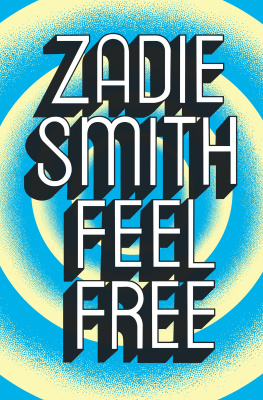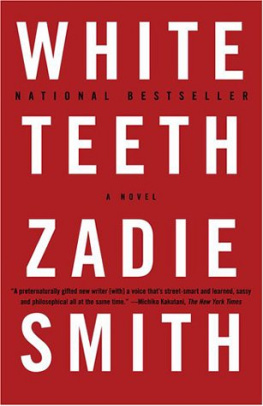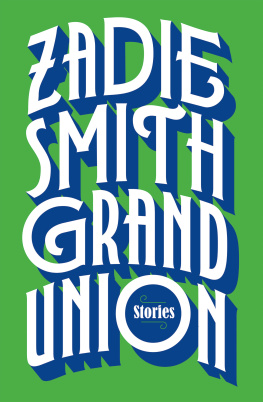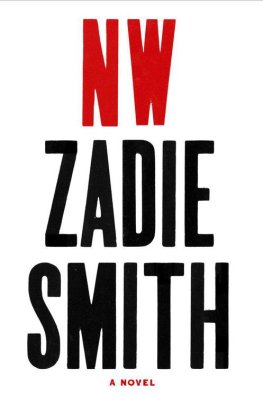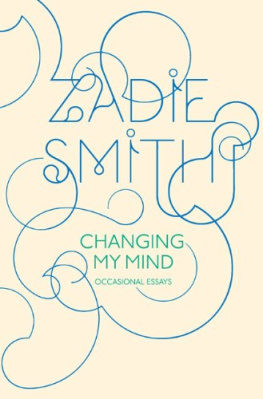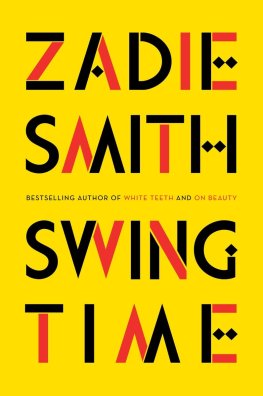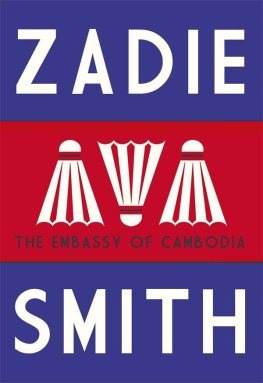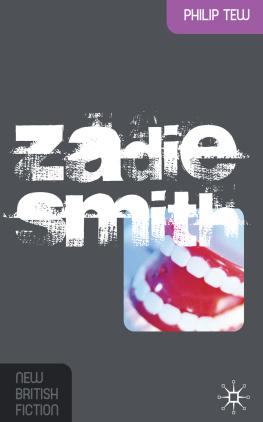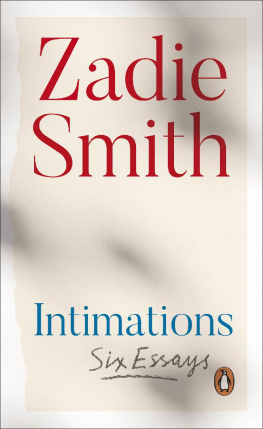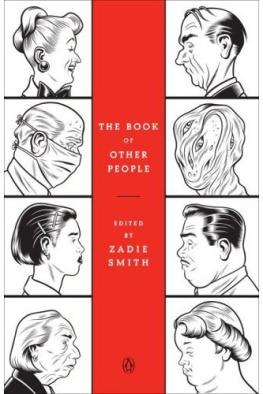BY THE SAME AUTHOR
White Teeth
The Autograph Man
On Beauty
NW
The Embassy of Cambodia
Swing Time
NONFICTION
The Book of Other People (editor)
Changing My Mind: Occasional Essays
HAMISH HAMILTON
an imprint of Penguin Canada, a division of Penguin Random House Canada Limited
Canada USA UK Ireland Australia New Zealand India South Africa China
Published in Hamish Hamilton hardcover by Penguin Canada, 2018
Simultaneously published in the United States by Penguin Press, an imprint of Penguin Random House LLC, 375 Hudson Street, New York, New York 10014
Copyright 2018 by Zadie Smith
Pages constitute an extension of this copyright page.
All rights reserved. Without limiting the rights under copyright reserved above, no part of this publication may be reproduced, stored in or introduced into a retrieval system, or transmitted in any form or by any means (electronic, mechanical, photocopying, recording or otherwise), without the prior written permission of both the copyright owner and the above publisher of this book.
www.penguinrandomhouse.ca
LIBRARY AND ARCHIVES CANADA CATALOGUING IN PUBLICATION
Smith, Zadie, author
Feel free / Zadie Smith.
ISBN 9780670068388 (bound).ISBN 9780143192602 (electronic)
I. Title.
PR6069.M59F74 2016 824.914 C2015-906644-1
Cover design by gray318

Version_1
For Kit and Hal
and
For Robert B. Silvers, in memoriam
People can be slave-ships in shoes.
Zora Neale Hurston
The eyes are not windows. There are nerve impulses, but no one reads them, counts them, translates them, and ruminates about them. Hunt for as long as you want, theres nobody home. The world is contained within you, and youre not there.
Daniel Kehlmann
CONTENTS
FOREWORD
I was having dinner with old friends in Rome when one of them turned to me and said: But of course your writing so far has been a fifteen-year psychodrama. Everybody laughedso did Ibut I was a little stung by it, and worried at the idea for a few weeks. Now here I am bringing it up in this foreword. Its true that for years Ive been thinking aloudand often wondering if Ive made myself ludicrous in one way or another. I think the anxiety comes from knowing I have no real qualifications to write as I do. Not a philosopher or sociologist, not a real professor of literature or film, not a political scientist, professional music critic or trained journalist. Im employed in an MFA program, but have no MFA myself, and no PhD. My evidencesuch as it isis almost always intimate. I feel thisdo you? Im struck by this thoughtare you? Essays about one persons affective experience have, by their very nature, not a leg to stand on. All they have is their freedom. And the reader is likewise unusually free, because I have absolutely nothing over her, no authority. She can reject my feelings at every point, she can say: No, I have never felt that or Dear Lord, the thought never crossed my mind!
Writing exists (for me) at the intersection of three precarious, uncertain elements: language, the world, the self. The first is never wholly mine; the second I can only ever know in a partial sense; the third is a malleable and improvised response to the previous two. If my writing is a psychodrama I dont think it is because I have, as the internet would have it, so many feels, but because the correct balance and weight to be given to each of these three elements is never self-evident to me. Its this selfwhose boundaries are uncertain, whose language is never pure, whose world is in no way self-evidentthat I try to write from and to. My hope is for a reader who, like the author, often wonders how free she really is, and who takes it for granted that reading involves all the same liberties and exigencies as writing.
A note: I realize my somewhat ambivalent view of human selves is wholly out of fashion. These essays you have in your hands were written in England and America during the eight years of the Obama presidency and so are the product of a bygone world. It is of course hardly possible to retain any feelings of ambivalenceon either side of the Atlanticin the face of what we now confront. Millions of more or less amorphous selves will now necessarily find themselves solidifying into protesters, activists, marchers, voters, firebrands, impeachers, lobbyists, soldiers, champions, defenders, historians, experts, critics. You cant fight fire with air. But equally you cant fight for a freedom youve forgotten how to identify. To the reader still curious about freedom I offer these essaysto be used, changed, dismantled, destroyed or ignored as necessary!
Zadie Smith
New York
January 18, 2017
IN THE WORLD
NORTHWEST LONDON BLUES
Last time I was in Willesden Green I took my daughter to visit my mother. The sun was out. We wandered down Brondesbury Park toward the high road. The French Market was on, which is a slightly improbable market of French things sold in the concrete space between the pretty turreted remnants of Willesden Library (1894) and the brutal red-brick beached cruise ship known as Willesden Green Library Centre (1989), a substantial local landmark that racks up nearly five hundred thousand visits a year. We walked in the sun down the urban street to the concrete spaceto market. This wasnt like walking a shady country lane in a quaint market town ending up in a perfectly preserved eighteenth-century square. It was not even like going to one of these farmers markets that have sprung up all over London at the crossroads where personal wealth meets a strong interest in artisanal cheeses.
But it was still very nice. Willesden French Market sells cheap bags. It sells CDs of old-time jazz and rock and roll. It sells umbrellas and artificial flowers. It sells ornaments and knickknacks and doodahs, which are not always obviously French in theme or nature. It sells water pistols. It sells French breads and pastries for not much more than youd pay for the baked goods in Greggs down Kilburn High Road. It sells cheese, but of the decently priced and easily recognizable kindBrie, goats, blueas if the market has traveled unchanged across the Channel from some run-down urban suburb of Paris. Which it may have done for all I know. The key thing about Willesdens French Market is that it accentuates and celebrates this concrete space in front of Willesden Green Library Centre, which is at all times a meeting place, though never quite so much as it is on market day. Everybodys just standing around, talking, buying or not buying cheese, as the mood takes them. Its really pleasant. You could almost forget Willesden High Road was ten yards away. This matters. When youre standing in the market youre not going to work, youre not going to school, youre not waiting for a bus. Youre not heading for the Tube or shopping for necessities. Youre not on the high road where all these activities take place. Youre just a little bit off it, hanging out, in an open-air urban area, which is what these urban high streets have specifically evolved to stop people from doing.
Everybody knows that if people hang around for any length of time in an urban area without purpose they are likely to become antisocial. And indeed there were four homeless drunks sitting on one of the librarys strange architectural protrusions, drinking Special Brew. Perhaps in a village they would be sitting under a tree, or have already been driven from the area by a farmer with a pitchfork. I do not claim to know what happens in villages. But here in Willesden they were sitting on their ledge and the rest of us were congregating for no useful purpose in the unlovely concrete space, simply standing around in the sunshine, like some kind of community. From this vantage point we could look ahead to the turrets, or left to the Victorian police station (1865), or right to the half-ghostly faade of the Spotted Dog (1893).

